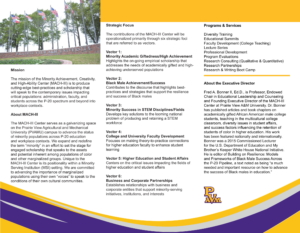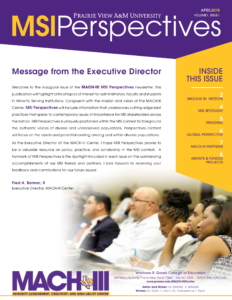MACH-III CENTER PUBLICATIONS
BOOKS
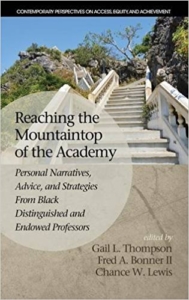
Reaching the Mountaintop of the Academy Personal Narratives, Advice and Strategies from Black Distinguished and Endowed Professors Edited by: Gail L. Thompson, Fayetteville State University Fred A. Bonner, II, Prairie View A&M University Chance W. Lewis, University of North Carolina at Charlotte A volume in the series: Contemporary Perspectives on Access, Equity, and Achievement. Editor(s): Chance W. Lewis, University of North Carolina at Charlotte. Published 2015 Since the U.S. Civil Rights era, the racial composition of higher education has changed dramatically, resulting in an increase in the number of African American students and African American faculty in predominantly white institutions (PWI). Nevertheless, the number of African American endowed or distinguished professors remains small. Because it is difficult for African American faculty to attain these prized positions, those who have done so possess invaluable knowledge that may be beneficial to others. Reaching the Mountaintop of the Academy: Personal Narratives, Advice and Strategies from Black Distinguished and Endowed Professors, fills an important niche in the canon of higher education literature. In the autobiographical chapters that follow, numerous distinguished and endowed professors (1) describe their personal journey to the distinguished or endowed professorship; (2) explain important life lessons that they learned during their journey; (3) describe their current professional goals; and (4) offer suggestions and recommendations for graduate students, untenured faculty, tenured faculty, and college/university administrators. At a time when many predominantly white higher education institutions continue to have difficulty attracting and retaining African American faculty, and African American faculty continue to struggle for full inclusion in the academy, this book is timely and needed.
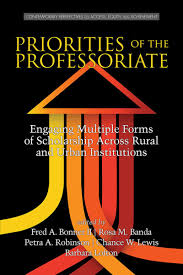
Priorities of the Professoriate Engaging Multiple Forms of Scholarship Across Rural and Urban Institutions Edited by: Fred A. Bonner, II, Prairie View A&M University Rosa M. Banda, Rutgers Petra A. Robinson, Louisiana State University Chance W. Lewis, University of North Carolina at Charlotte Barbara Lofton, University of Arkansas-Fayetteville A volume in the series: Contemporary Perspectives on Access, Equity, and Achievement. Editor(s): Chance W. Lewis, University of North Carolina at Charlotte. Published 2015 Established in 2006, the American Association of Blacks in Higher Education (AABHE), formerly constituted as the Black Caucus (American Association of Higher Education), has been the consistent voice of Black issues in academe. According to the stated mission, the AABHE pursues the educational and professional needs of Blacks in higher education with a focus on leadership, equity, access, achievement and other vital issues impacting students, faculty, staff, and administrators. AABHE also facilitates and provides opportunities for collaborating and networking among individuals, institutions, groups and agencies in higher education in the United States and internationally. This 2012 year will mark the beginning of the AABHE research consortium, an arm of the organization that will advance scholarly research and publications to highlight critical issues pertinent to the success and uplift of Black populations across the higher education diaspora. This book will explore important issues across multiple fields—fields represented by the scholars/members of AABHE. AABHE scholars will contribute chapters based on their disciplinary expertise. The work of Earnest Boyer as articulated in the book Faculty Priorities Reconsidered: Rewarding Multiple Forms of Scholarship will be used as the conceptual foundation to ground this important work. A particular focus on the elements of Boyer’s seminal work will include chapters devoted to the Scholarship of Teaching and Learning; Scholarship of Engagement; Scholarship of Discovery; and Scholarship of Integration. This scholarly book is unique in that it provides essential insight on how not only faculty, but also administrators who are invested in insuring that the priorities of the professoriate are aligned with the mission and vision of urban postsecondary institutions.
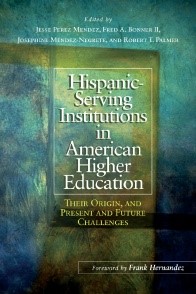
Hispanic-Serving Institutions in American Higher Education Their Origin, and Present and Future Challenges Edited by Jesse Perez Mendez, Fred A. Bonner II, Josephine Méndez-Negrete, Robert T. Palmer Foreword by Frank Hernandez This is the first book to exclusively address Hispanic Serving Institutions (HSIs), filling a major gap in both the research on these institutions and in our understanding of their approaches to learning and their role in supporting all students while focusing on Hispanic students. Born out of the reauthorization of the Higher Education Act of 1992 and are classified as such if their enrollment of Latino students account for a quarter of their undergraduate enrollment, the number of HSIs and their impact in higher education is growing. Today there are approximately 370 HSIs, 277 emerging HSIs, and their numbers are steadily increasing. Given the projected growth of the Latino population, and HSIs’ record of advancing the success for Hispanic students in STEM fields, as well as of graduating nearly a third of all Hispanic bachelor’s degree recipients, their work has important implications for higher education at large. Written by leading and rising scholars on HSIs, this book offers insight into the complexity of these institutions. It not only addresses historic policy origins, but also describes the experiences of various student populations served, faculty issues (i.e., governance, diversity, work/life experience, etc.), the impact of student affairs in advancing student development, and considers funding and philanthropy efforts. The book also critically examines challenges that many of these institutions face – disjointed mission statements regarding support of their Latino/a student populations, governance structures that support the status quo, and the financial incentive to achieve HSI designation that may not correlate with enhancing the climate for Latinos. This book touches on the many facets of HSIs, painting an organic mosaic of institutions in position to advance Latino postsecondary progress, both chronicling the contemporary challenges that these institutions face while also looking to their future.
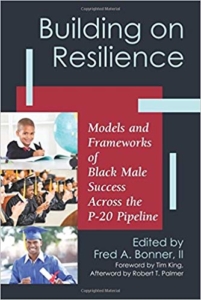
Building on Resilience Models and Frameworks of Black Male Success Across the P-20 Pipeline Edited by Fred A. Bonner II Foreword by Tim King How do we fix the leaky educational pipeline into a conduit of success for Black males? This critical issue is demonstrated by statistics that only 10% of Black males in the United States are proficient in 8th grade reading, only 52% graduate from high school within four years, and only 35% graduate from college. This book uniquely examines the trajectory of Black males through the educational pipeline from preschool through college. In doing so it not only contributes significantly to the scholarship on the experiences of this population, but bridges the gap between theory and practice to provide frameworks and models that will improve these young men’s educational outcomes throughout their educational journeys. A compelling feature of the book is that that it does not treat Black males as homogeneous, but recognizes the diversity that exists among Black males in various educational settings. It demonstrates the need to recognize students’ intersectionalities and individual characteristics as an essential preliminary to developing practices to improve outcomes at every educational stage.
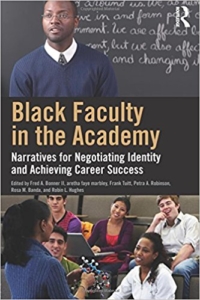
Black Faculty in the Academy Narratives for Negotiating Identity and Achieving Career Success Edited by Fred A. Bonner II , aretha faye marbley , Robin L. Hughes , Frank Tuitt , Petra A. Robinson and Rosa M. Banda Print publication date: December 2014 Through candid discussions and personal counter-narrative stories, Black Faculty in the Academy explores the experiences and challenges faced by faculty of color in academe. Black faculty in predominantly White college and university settings must negotiate multiple and competing identities while struggling with issues of marginality, otherness, and invisible barriers. This important book illuminates how faculty can develop a professional identity that leads to success in academe, while at the same time remaining true to cultural and personal identities. Through rich narratives, chapter authors situate race-related encounters at the center of their experience in an effort to deconstruct and challenge commonly held assumptions about life in academe. They also provide key recommendations and strategies to help faculty of color ensure their continued professional success. Framed by critical race theory, these stories show how faculty can successfully maneuver through all stages of a career in academe, including tenure and promotion, publication, mentoring, networking, teaching, and dealing with institutional climate issues. This valuable book is for faculty and administrators seeking to create an environment that nurtures professional growth and fosters success among Black faculty.
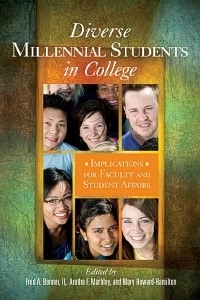
Diverse Millennial Students in College Implications for Faculty and Student Affairs Edited by Fred A. Bonner II, Aretha F. Marbley, Mary F. Howard-Hamilton While many institutions have developed policies to address the myriad needs of Millennial college students and their parents, inherent in many of these initiatives is the underlying assumption that this student population is a homogeneous group. This book is significant because it addresses and explores the characteristics and experiences of Millennials from an array of perspectives, taking into account not only racial and ethnic identity but also cultural background, sexual orientation, and socioeconomic status differences—all factors contributing to how these students interface with academe. In providing a “voice” to “voiceless” populations of African American, Asian American, Bi/Multi-Racial, Latino, Native American, and LGBT millennial college students, this book engages with such questions as: Does the term “Millennial” apply to these under-represented students? What role does technology, pop culture, sexual orientation, and race politics play in the identity development for these populations? Do our current minority development theories apply to these groups? And, ultimately, are higher education institutions prepared to meet both the cultural and developmental needs of diverse minority groups of Millennial college students?” This book is addressed primarily to college and university administrators and faculty members who seek greater depth and understanding of the issues associated with diverse Millennial college student populations. This book informs readers about the ways in which this cohort differs from their majority counterparts to open a dialogue about how faculty members and administrators can meet their needs effectively both inside and outside the classroom. It will also be of value to student affairs personnel, students enrolled in graduate level courses in higher education and other social science courses that explore issues of college student development and diversity, particularly students planning to work with diverse Millennial college students in both clinical or practical work settings.
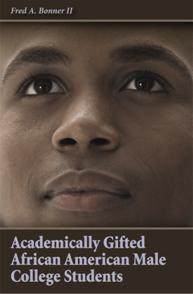
Academically Gifted African American Male College Students Fred A. Bonner II Foreword by Kofi Lomotey Afterword by Donna Y. Ford At a time when so many studies of African American students focus on the factors of failure, Academically Gifted African American Male College Students fills a conspicuous void in the research literature on postsecondary education by focusing on success. Like no other work before it, this remarkable study goes deep inside the experiences of academically gifted African American men who successfully navigate their way through rigorous college level programs. At the heart of the unique and long overdue work are two real-life stories of African American male students: one at a Historically Black College and University (HBCU) and the other at a Traditionally White Institution (TWI). In presenting, comparing, and contrasting these two cases, the book identifies a number of personal characteristics and institutional approaches driving their notable achievements. The result is a guidebook both for gifted African American male students and for the institutions looking to strengthen their support for them—particularly in science, technology, engineering, and mathematics (STEM) disciplines. FEATURES Presents two separate case studies revealing how academically gifted African American males experienced different higher education contexts— the Historically Black College and University (HBCU) and Traditionally White Institution (TWI).
JOURNAL ARTICLES AND WHITE PAPERS
Bonner, F. A. II, Smith, S. L, Williams, K. V., & Marbley, A. F. (Eds). (in progress). Square Pegs and Round Holes: Alternative Student Development Frameworks and Models for Higher Education and Student Affairs. Sterling, VA: Stylus Publishing. Bonner, F. A. II, Williams, K. V., & Smith, S. L. (in progress). An Intersectional Analysis of U.S. African American Students in STEM: The Impact of Race, Gender, and Socioeconomic Status on Underrepresented STEM Majors at Historically Black College and Universities (HBCUs). International Journal for Talent Development and Creativity. Lewis, C. W., Bonner, F. A. II, Long, J., Hill-Jackson, V., Bowman-Perrott, L. & James, M. (in press). An exploratory descriptive analysis into the behavior patterns of African American males in a Midwestern school district: Implications for teachers, counselors, administrators, policymakers, and politicians. SOULS: A Critical Journal of Black Politics, Culture, and Society. Miller, R. A., Guida, T., Smith, S. L., Ferguson, S. K., & Medina, E. G. (in press). A balancing act: Whose interests do bias response teams serve? The Review of Higher Education. Bonner, F. A. II. (2017). HBCUs, Trump, and Student Development: The Band Played On, Diverse Issues in Higher Education. Retrieved from http://diverseeducation.com/article/91494/ Bonner, F. A. II. (2017). Why Betsy Devos Will Never Be the HBCUs’ Boo, Diverse Issues in Higher Education. Retrieved from http://diverseeducation.com/article/96880/ Bonner, F. A., II. & Goings, R. B. (Eds.) (2017). Disrupting the Narrative: High-achieving African American males in higher education. Journal of African American Males in Education, 8(1). Bonner, F.A. II, & Hilton, A. (Eds.). (2017). Black Males in Urban Post-Secondary Education: Examining Their Experiences in Diverse Institutional Contexts. Urban Education. 52(9). Coward, L., Smith, S.L. & Koledoye, K. (2017). Continuing on to Graduate School in STEM. In Kanagala, V. & Rendon, L. (Eds). The Latino Student’s Guide to STEM Careers (pp.89-114). Santa Barbara, California. Marbley, A. F., Rouson, L., Burley, H., Ross, W., Bonner, F. A. II, Jiaqi, L., Lértora, I. Huang, S., (2017). 3-C models: Teaching tools to promote social justice. Multicultural Education. 24, 2-10. Miller, R. A., Guida, T., Smith, S. L., Ferguson, S. K., & Medina, E. G. (2017). Free speech tensions: Responding to bias on college and university campuses. Advance online publication. Journal of Student Affairs Research and Practice, 54(4). doi: 10.1080/19496591.2017.1363051


